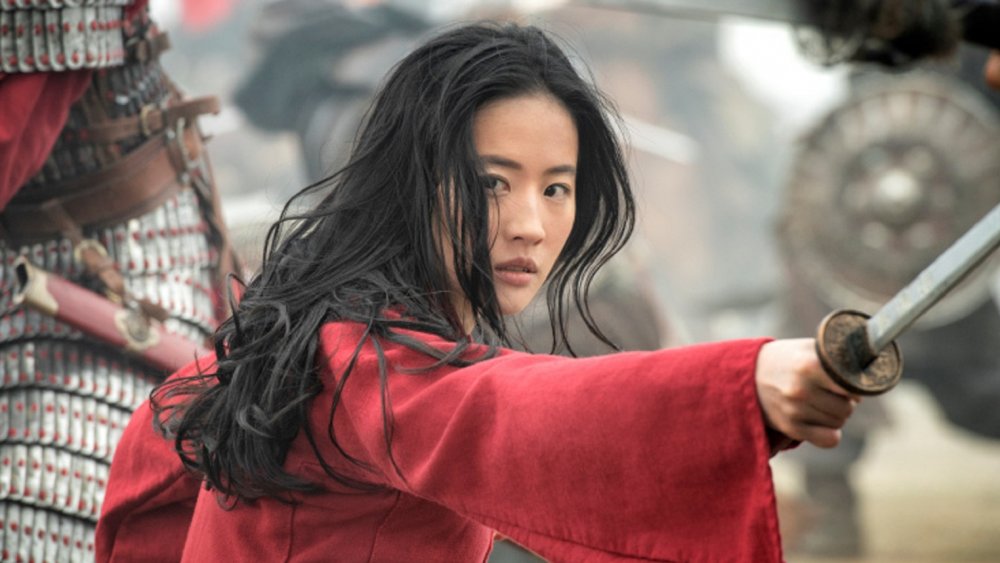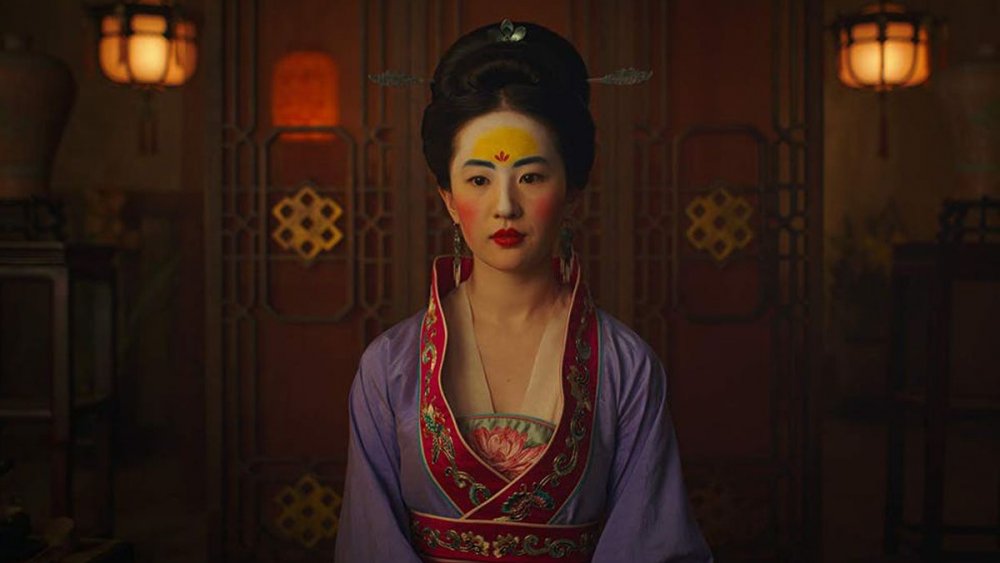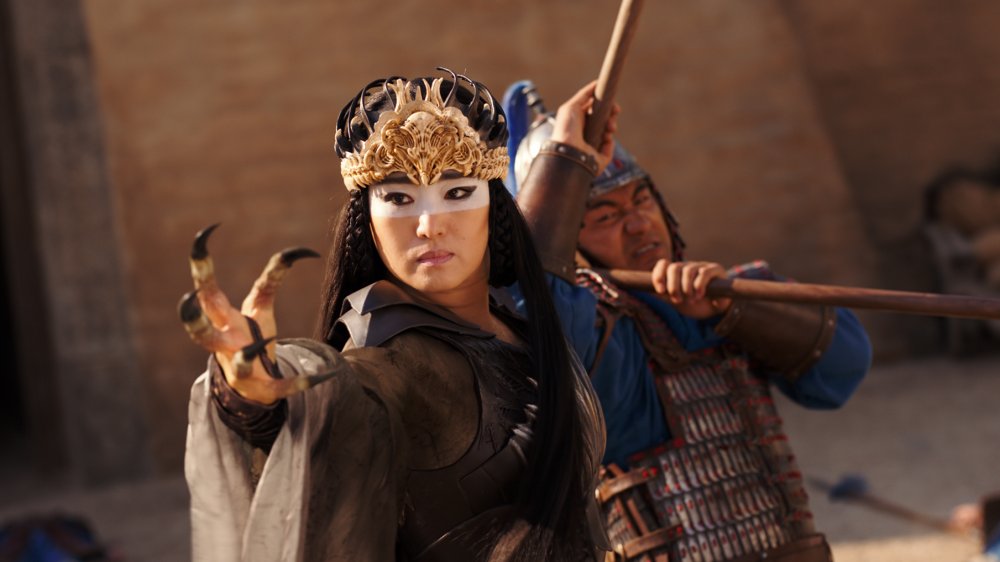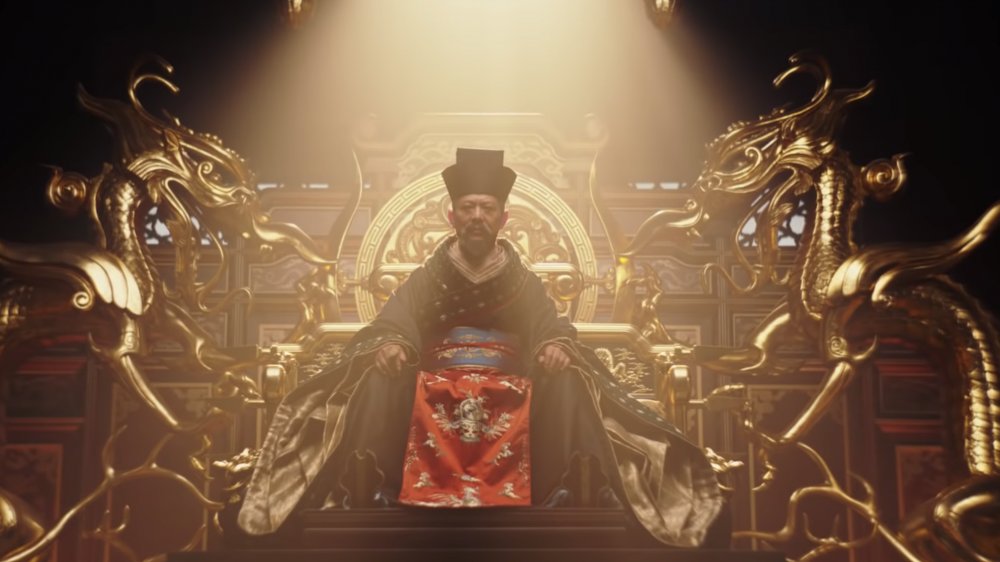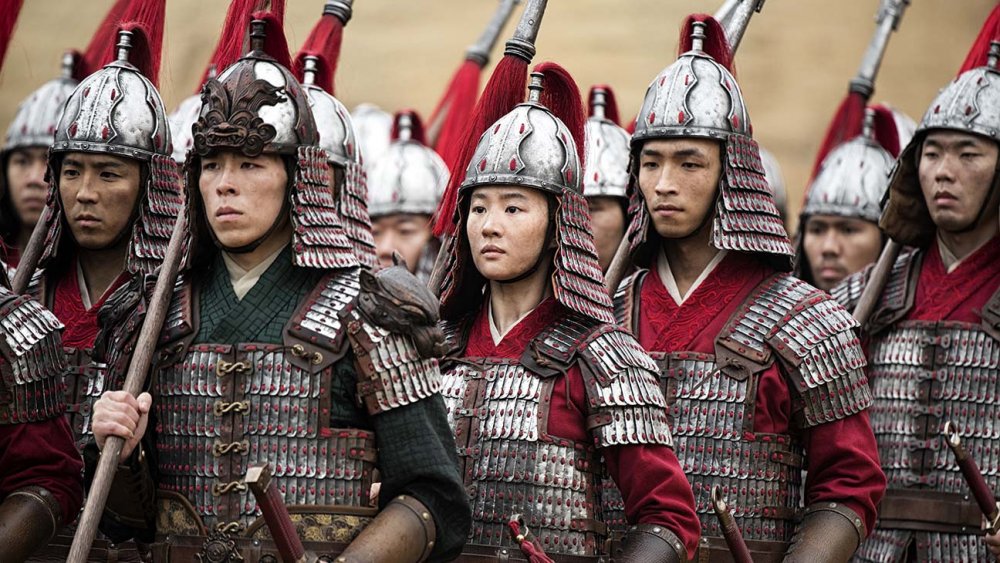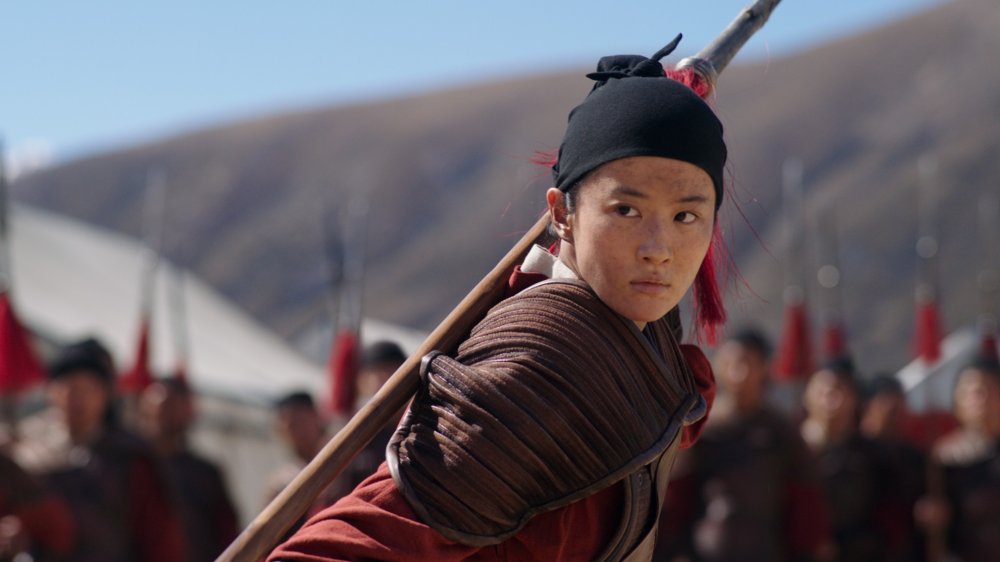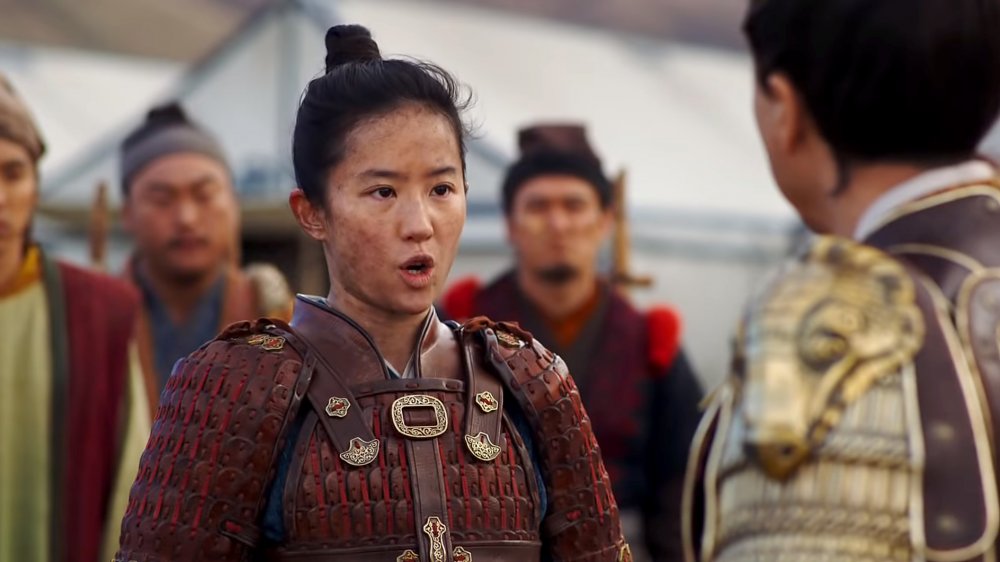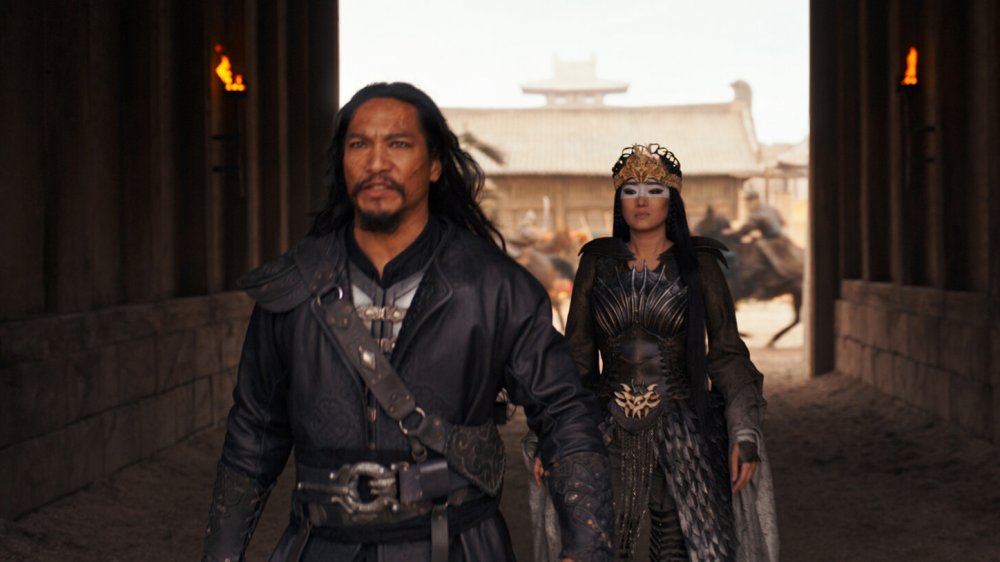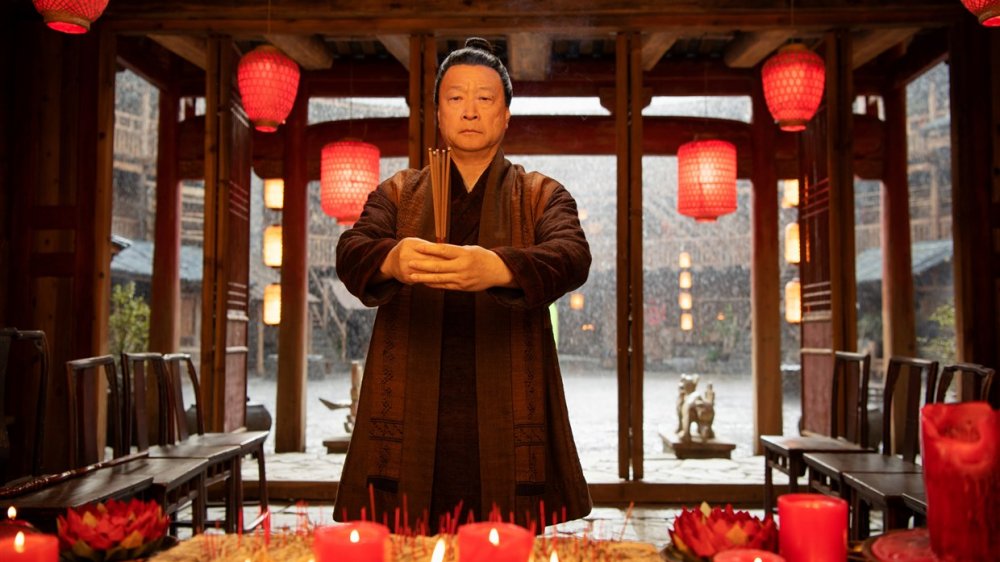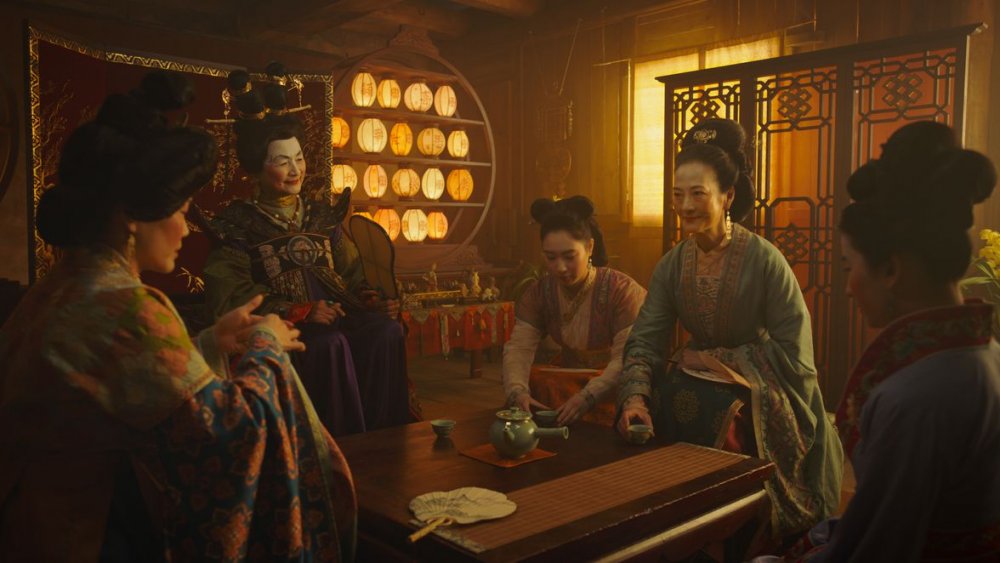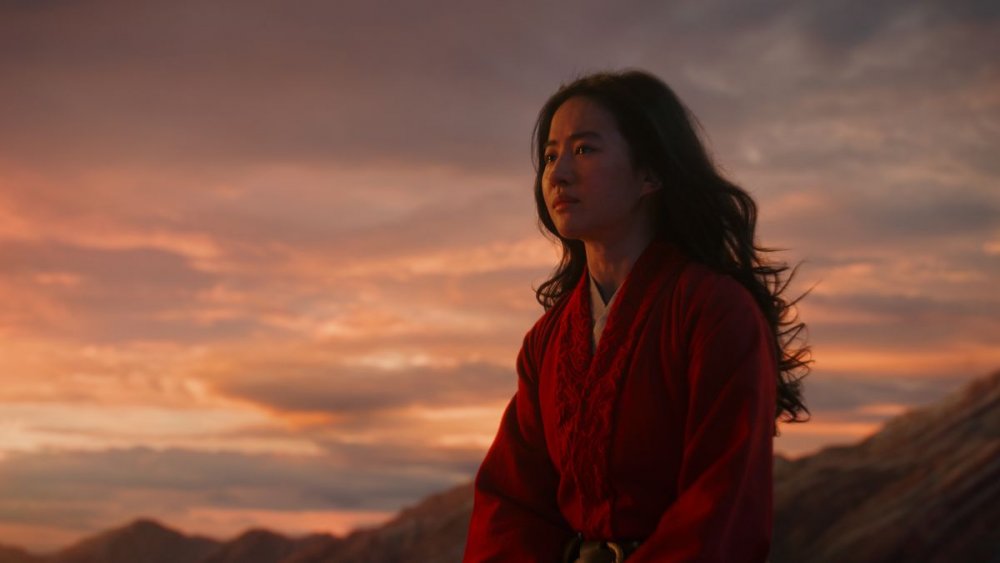Things Only Adults Notice In The Live-Action Mulan
After multiple theatrical delays due to the coronavirus pandemic, Disney finally made the decision to release its long-awaited, live-action Mulan remake directly to its streaming service, Disney+, for the "Premier Access" price of $29.99. The wuxia-inspired action film premiered on Disney+ on September 4, 2020, allowing viewers to take in the lavish scenery, breathtaking battle sequences, and stunning choreography, all from the comforts of their own homes.
While other live-action Disney remakes such as The Lion King and Beauty and the Beast were largely transcriptions of their animated counterparts, Mulan follows more in the footsteps of Pete's Dragon and Cinderella, providing a fresh spin on the beloved animated movie. This version of Mulan has no songs, slapstick humor, or talking dragons, taking a more serious tone and leaning more heavily into the Chinese martial arts film tradition that serves as a strong influence here. While there are still plenty of callbacks to the animated film, as well as lots for both kids and adults to enjoy, some of the changes for the live-action Mulan will probably prompt some consideration in adults that will likely go straight over most kids' heads. From symbolic imagery to systemic societal issues, here are some of the things only adults notice in the live-action Mulan.
Mulan uses visual imagery to symbolize societal constraints
Early on in Mulan, as Mulan (Liu Yifei) prepares to meet with the village matchmaker (Pei-Pei Cheng) in the hopes that she might arrange an auspicious marriage for her, her mother (Rosalind Chao) helps her get dressed up and paints her face in order to make the best possible impression. During this "getting ready" sequence, we see a number of laces and ribbons being tied tight as Mulan grimaces, showing clearly how constricting she finds not only the clothing but the entire affair. When she emerges, she comments to her sister, Xiu (Xana Tang), that the getup completely prevents her from expressing herself, noting that the makeup makes all of her expressions appear the same.
This isn't the only time that binding imagery is used to convey Mulan having to suppress who she really is. Most notably, she has to bind her chest in order to pass as a male soldier in the army, and the removal of those bindings later help symbolize the "death" of her male alter ego, Hua Jun, and the emergence of Hua Mulan as her true self. Once she embraces her identity, she also undoes the bindings of her armor and hair ties, dropping them into the dirt as she rides forward, free of restraints. Kids will definitely pick up on the idea that Mulan is shedding a false sense of who she was supposed to be, but adults are more likely to notice that binding has been a recurring theme since the very beginning of the movie, symbolizing not just Mulan's internal struggle but the external pressures of what society determines women should be.
Mulan's use of shadows underscores one of its most powerful themes
Along with the recurrent images of binding and unbinding used to symbolize Mulan's adherence to societal expectations and her subsequent bucking of those expectations, Mulan also makes frequent use of shadows to show transformation and the outward perception of identity. Often, this is how the film portrays Xianniang's (Gong Li) transformations into her various forms, but shadows and reflections also factor prominently into Mulan's journey to becoming a self-actualized warrior.
For Xianniang, whose life has taught her that her choices are to either hide who she is or be shunned by society, we see her largely through shadows. That is to say, we often don't see her directly at all. Instead, when she's at her most powerful, we only see a hazy obfuscation of her form, which feels like a metaphor for how she feels as though she can never be fully seen as her true self.
Meanwhile, for Mulan, she's often shown in reflections — an intentional callback to one of the animated film's most poignant songs — which highlights the incongruity between the person she feels she is on the inside and the image she has to project on the outside. For much of the film, when Mulan looks at herself, she sees what others see — a dutiful daughter, a male warrior — and that reflection wars with her own perception of herself. The choice to portray the film's two most powerful female characters through the visual devices of shadows and reflections helps convey their internal struggles with their own self-image and their fears of showing the world who they truly are.
Mulan's devotion to the Empire is a little concerning
Kids probably won't think to question Mulan and her family's unswerving devotion to the Emperor (Jet Li) and his dynasty, but modern adult viewers may wonder if Mulan's cause is quite as just as she believes. After Mulan is banished from her regiment, Xianniang tries to explain to her that the society in which they live has no room for powerful women like them, but that together, she and Mulan may be able to make a new society that won't reject them. However, Mulan doesn't even seem to consider what Xianniang is saying, and she rushes off to save the Emperor from Böri Khan's (Jason Scott Lee) attack.
As a matter of fact, Mulan never once seems to interrogate the idea of what unquestioning fealty to an imperial system means for people like her, even though she previously felt stifled by that very system. Sure, the Emperor seems like a nice enough guy, but especially for adults watching through the lens of modern society, it wouldn't be unreasonable to wonder whether we should really be rooting for Mulan to safeguard his dynasty. Granted, the 1998 film never questions the governmental structure Mulan vows to uphold, either, but in 2020, it seems like a little healthy introspection may have been both warranted and welcome. As it stands, it seems a little alarming that Mulan fights so hard to maintain a status quo that grants tremendous power to men of a certain bloodline, while keeping women as a subservient class.
Those were not 'friendship' looks coming from Honghui
Originally, fans of General Li Shang in 1998's Mulan were outraged when Disney announced that the popular character was being axed for the remake. At first, many fans assumed that this meant that Mulan wouldn't have a love interest at all, and they were upset not only that the storyline would be excised, but also that it would constitute erasure of a character many have long interpreted as bisexual. Later, Disney clarified that Li Shang would actually be split into two characters — Mulan's intimidating commanding officer, Commander Tung (Donnie Yen), and her fellow army recruit and love interest, Honghui (Yoson An). In large part, this decision was made so as to not include an unbalanced and problematic power dynamic with Mulan having a romantic entanglement with her commanding officer.
However, adults won't be able to ignore that the looks Honghui is giving Hua Jun contain far more than brotherly affection, keeping that Li Shang energy alive and well. One could argue that Honghui suspected that Mulan was female all along, but considering that none of the other characters caught on to Mulan's deception, the simpler explanation is that Honghui was simply attracted to Hua Jun. His demeanor toward Mulan remains much the same after her true identity is revealed, implying that his attraction was never really because of or in spite of her gender. It remained constant whether she was Hua Jun or Hua Mulan.
The real enemy is the patriarchy
Mulan contains a number of impressive battle sequences, but none of the foes Mulan has to fight loom nearly as large as the sexism she encounters in every facet of life. Whether she's trying to bring honor to her family through an arranged marriage or bring honor to her country through her skilled fighting as a soldier, she's constantly butting up against the societal constraints placed upon women. She's told that her powerful qi is a liability for a woman, although it would be an asset for a man (as we later see when Hua Jun is commended for demonstrating the same skill that got Mulan reprimanded earlier). And during training, the soldiers are told that bringing a woman into the camp is punishable by death — with no one realizing that there's already a woman present, and she's the strongest warrior among them.
What's more, this same sexist oppression is what drove Xianniang to side with Böri Khan in the first place. She tells Mulan that she tried to find a noble path forward while remaining true to her skills, but it didn't exist within acceptable society. The only options available to her were to either ally herself with an enemy of the kingdom or deny her own power. Considering that Xianniang is hugely instrumental in gaining Böri Khan most of his tactical advantages during the film, it's hard to miss that if society hadn't been so intent on oppressing women, the Emperor may not have needed saving in the first place.
Mulan challenges what it means to be 'true'
One of the recurring mantras in Mulan are the three pillars of virtue inscribed on her father's sword, which Mulan is constantly trying to embody. She wants to be loyal, brave, and true. At the beginning, she strives to make her family proud through living out these virtues as a daughter should ... through restraining her impulses in order to present herself well and make a good and respectable match. Later, she experiences a crisis of conscience when she realizes she can't possibly be "true" while also deceiving everyone around her. Ultimately, she comes into her own when she rejects both the societal expectations for women and the pretense of being a man, all before embracing her own unique skills and identity.
It's interesting that for the majority of the film, it seems as though everyone in Mulan's life, including her, assumes that being "true" means to accept her place in her family and in society and to stop bucking traditions and questioning cultural norms. If Mulan had remained a demure and subservient daughter (and eventually wife), everyone would've assumed that she was being true to the role that had been given to her. But by the end of the film, we're shown that what's actually "true" for Mulan is a path that didn't even exist before she carved it out for herself. While kids will likely be content to embrace the film's themes of self-acceptance on a surface level, adults are more equipped to unpack the complex idea that our understanding of who we are can change over time, and that sometimes, the most honest path forward is one we didn't even think was a possibility earlier.
Xianniang was never the villain
In all the promotional material for Mulan, it seemed as though Xianniang, with her magical transformative powers, was going to be the main antagonist of the film. Indeed, the beginning of the film sets up this very dichotomy, pitting Xianniang against the Emperor to whom Mulan and her family are loyal. But by the end, Xianniang has seen an alternate version of herself in Mulan, and she ultimately sacrifices herself to save the younger woman. Kids won't miss any of that — it's right there on the screen, plain as day.
But what might go undetected by younger viewers is that Xianniang wasn't really a villain who experienced an eleventh hour change of heart. In actuality, she was never really a villain at all. Xianniang tells Mulan that she joined forces with Böri Khan because he was the only one who provided a place for her and allowed her to be who she was. But as we see before their encounter, she's really more of a prisoner than a lieutenant, and she still yearns for true freedom. Yes, she does Böri Khan's bidding for much of the film, but her true motivation is to create a society in which she can be accepted without having to diminish herself. In Mulan, she sees the possibility of that society, and she gives her life to help it come into being. Rather than an antagonist working against the hero, Xianniang proves herself to be a tragic figure who was ultimately working toward the same goals as Mulan.
Hua Zhou doesn't need Mulan to prove herself
By the end of the film, Mulan has returned home to her village, having refused the Emperor's offer to officially join his army as a soldier. Her reasoning is that she betrayed her family when she stole her father's armor and ran away in the dead of night, and she must return home in order to beg their forgiveness and restore their honor. But when she's reunited with her family, they're not angry with her for leaving, but rather, they're relieved that she finally came back home. Her father, in particular, tells her that she means more to him than anything, that he recognizes now that she's a warrior, and that he should've seen that all along.
Obviously, considering we've just seen Mulan fight and win huge battles, defeat Böri Khan single-handedly, and get recognized by the Emperor, this exchange makes complete sense. But what young viewers may not have quite pieced together is that Hua Zhou wouldn't actually know any of that yet. As children, it's easy to assume that the characters know whatever we know, but as adults, the flow of information becomes a lot clearer. When her father says he sees that Mulan is a warrior, he didn't come to that revelation because he'd heard of her great feats in battle, but instead, it's because he finally admitted to himself the truth he'd always known about his daughter. It turns out that none of Mulan's accomplishments were actually necessary in order to get her father to finally see her. He'd seen who she was from the beginning.
The women of Mulan are still far from liberated
At the end of Mulan, it seems like women's rights have taken a big step forward, as Mulan is commended by the Emperor and invited to serve as an officer in the Emperor's guard under her own name. But really, while Mulan herself has come a long way, not much has been done for any of the other women living alongside her. She returns home to find her sister excited about her upcoming arranged marriage, with the other women in her village still in exactly the same circumstances as when she left.
Granted, none of the other women in Mulan have given any indication that they wanted anything else for their lives, but that could be simply because they never considered that other options might be open to them. Xianniang, the only other woman who wanted something more than what society was prepared to offer, is dead by the film's end, having sacrificed herself in the hopes that Mulan might usher in a new way of life. Kids may be satisfied that Mulan herself is able to finally lead the life she wants, but adults may wonder how much has really changed and if Xianniang's sacrifice wound up having much of an impact after all.
Mulan's biggest battle is likely yet to come
Mulan going to accept her commission as an officer in the Emperor's guard is presented as a happy ending, and since Mulan is a Disney film, viewers are conditioned to fill in a happily-ever-after ending once the credits roll. But in actuality, Mulan likely has an extremely hard road ahead of her. Remember, the army that she's going to join is the same one that, earlier in the film, reminded its soldiers that the presence of a woman in the camp was punishable by death, and up until Mulan's induction, it had never permitted the inclusion of women.
Although the men who trained with and fought beside Mulan against Böri Khan are ready and willing to accept her as a fellow warrior, there are likely plenty of other men in the Emperor's guard who don't know her personally and aren't going to be thrilled at the idea of admitting a woman to their ranks, much less as a leader. Not all men will find it easy to adjust their thinking and let go of the way things have always been done in the past, and it's probable that several (or even most) of Mulan's fellow soldiers could decide to make her life particularly difficult in order to "prove" that women have no place among them. Mulan was able to earn the respect of her peers as a woman once before, but that was only after she'd previously earned it as a man. Her new career as the only female officer in the Emperor's guard will no doubt be a tremendously challenging one, but we are sure she's up to the task.
